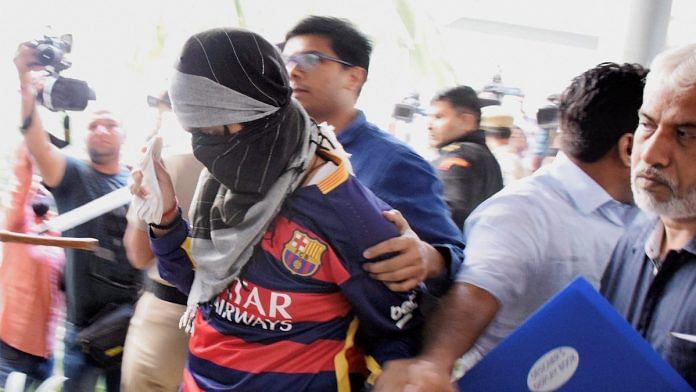New Delhi: The Haryana government has declined permission to prosecute four police officials charged with falsely framing a bus conductor in the 2017 murder of a 7-year-old boy inside a private school in Gurugram.
The government order, a copy of which is with ThePrint, was submitted before a special CBI court in Sonepat Monday.
Signed by Rajeev Arora, additional chief secretary of Haryana’s home department, the order said the evidence relied upon by the Central Bureau of Investigation (CBI) shows some amount of “inaccurate discrepancy” in police documentation but does not prove any criminal intent and mens-rea (referring to criminal intent) on the officers’ part to wrongly implicate a person.
The body of a class 2 student, with his throat slit, was found inside the premises of a private school in Gurugram on 8 September 2017. After the registration of a murder case, the local police had, on the same day, arrested Ashok Kumar, conductor of a school bus.
Following widespread outrage, the case was later handed over to the CBI, which arrested a class 11 student of the same school for the murder and filed a closure report. The investigating agency gave Kumar a clean chit on 28 February 2018, and a separate probe began against the four police officers, including then ACP Birem Singh.
It was in the same special CBI court in Sonepat, mentioned above, that the investigating agency had filed its charge sheet against the four officers under sections 166, 166A (both sections deal with officers who disobey the law), 330 (voluntarily causing hurt to extort confession), 506 (criminal intimidation), 120B (criminal conspiracy) of the Indian Penal Code (IPC).
The Haryana government’s decision came six months after the CBI sought its permission to prosecute the policemen. On 2 February, the special CBI court had slammed the state for sleeping “like a Kumbhkaran” over its request.
Also read: Courts took a break from being conservative this week. MJ Akbar, FB sedition cases show
‘No sufficient evidence to prosecute police officers’
Since a serving government servant cannot be prosecuted without a prior sanction from their reporting authority, the CBI had approached the Haryana government.
This was done according to section 197 of the Criminal Procedure Code (CrPc) that prohibits a court to take cognisance of an offence allegedly committed by a government officer in discharge of his or her official duty without prior sanction from a competent officer.
“And, after carefully examining the material placed before (governor of Haryana), the investigation report of CBI, disclosure statements, statement of witnesses, recovery memos and other relevant material, the Haryana government is satisfied that there is no sufficient evidence to prosecute the police officers for the offence punishable under sections 166, 166A, 330, 506, 120B of the IPC,” read the government order.
With the state refusing sanction to prosecute the policemen, the only option left with the special CBI court now is to close the case against them.
However, advocate Sushil Tekriwal, who represents the victim’s father, Monday urged the court to adjourn the case so that the family has an opportunity to move the Punjab and Haryana High Court against the government order. At this request, the court fixed 19 March as the next date of hearing in the matter.
Speaking with ThePrint, Tekriwal expressed shock that the government was protecting those who conspired to frame an innocent man to save the main culprit. “This is an extreme example of immunity from prosecution granted by state without application of mind despite the conspiracy and criminal intent to torment and incriminate the innocent,” Tekriwal said.
‘Discrepancy in police documentation minor in nature’
Noting that the objective of section 197 CrPc is to protect public servants against possible vexatious criminal proceedings and allows the government to act in executive capacity, the government order also held that the CBI relied “merely on oral statements” against the policemen.
It said Kumar was subjected to regular medical examination but no documents were submitted in support of CBI’s plea seeking sanction regarding the charge of voluntarily causing hurt to Kumar to extort a confession from him.
On the second charge, related to inaccurate documentation by the police, the government stated that some amount of inaccuracy or discrepancy, “minor in nature,” was found.
However, this cannot per se be punishable by criminal prosecution unless there is criminal intent and mens-rea that proves there was intent to falsely implicate a person, the government order noted.
‘Error of judgement may be negligence, not an offence’
Investigation of crime, the government order said, is conducted by considering various angles by an investigation agency. It noted that the charges sought to be made out against police officials are distinct and severable from the main case entrusted to the CBI, which was the murder case.
The court said, “There may be instance of not adopting a correct approach depending upon circumstances of the case, but the intent of the investigating officer to conduct the investigation in the right perspective has to be seen. The intent and ultimate objective of both the agencies, that is the SIT and CBI, was to focus of the investigation of the main offence of murder of the boy and to crack the crime.”
An act or omission of lack of efficiency or failure to attain highest standards of investigating ability may not, by itself, amount to or constitute an offence. Error of judgement in evaluating the situation, may be some sort of negligence but would not constitute an offence in the absence of the intent and mens-rea, stated the court order.
Also read: SC clarifies on plea against Rajdeep Sardesai, says contempt case ’inadvertently’ listed



